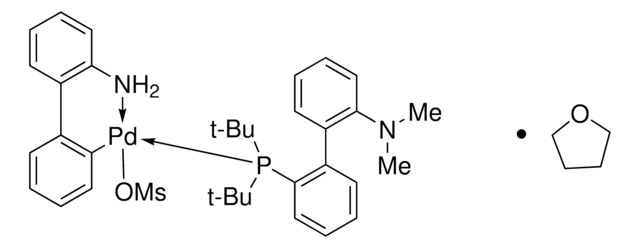695874
2-Di-tert-butylphosphino-2′-(N,N-dimethylamino)biphenyl
Synonyme(s) :
tBuDavePhos
About This Item
Produits recommandés
Forme
solid
Niveau de qualité
Pertinence de la réaction
reagent type: ligand
reaction type: Arylations
reagent type: ligand
reaction type: Buchwald-Hartwig Cross Coupling Reaction
reagent type: ligand
reaction type: C-X Bond Formation
Pf
114-118 °C
Groupe fonctionnel
phosphine
Chaîne SMILES
CN(C)c1ccccc1-c2ccccc2P(C(C)(C)C)C(C)(C)C
InChI
1S/C22H32NP/c1-21(2,3)24(22(4,5)6)20-16-12-10-14-18(20)17-13-9-11-15-19(17)23(7)8/h9-16H,1-8H3
Clé InChI
PHLPNEHPCYZBNZ-UHFFFAOYSA-N
Catégories apparentées
Application
Dialkylbiaryl phosphine ligand often used for Pd-catalyzed reactions in a range of contexts.
Mention d'avertissement
Warning
Mentions de danger
Conseils de prudence
Classification des risques
Aquatic Chronic 4 - Eye Irrit. 2 - Skin Irrit. 2 - STOT SE 3
Organes cibles
Respiratory system
Code de la classe de stockage
11 - Combustible Solids
Classe de danger pour l'eau (WGK)
WGK 3
Point d'éclair (°F)
Not applicable
Point d'éclair (°C)
Not applicable
Équipement de protection individuelle
dust mask type N95 (US), Eyeshields, Gloves
Faites votre choix parmi les versions les plus récentes :
Déjà en possession de ce produit ?
Retrouvez la documentation relative aux produits que vous avez récemment achetés dans la Bibliothèque de documents.
Les clients ont également consulté
Articles
Buchwald phosphine ligands for C-C, C-N, and C-O bond formation.
Contenu apparenté
The Buchwald group has developed a series of highly active and versatile palladium precatalysts and biarylphosphine ligands used in cross-coupling reactions for the formation of C-C, C–N, C–O, C–F, C–CF3, and C–S bonds. The ligands are electron-rich, and highly tunable to provide catalyst systems with a diverse scope, high stability and reactivity. Furthermore, the new series of precatalysts are air-, moisture and thermally-stable and display good solubility in common organic solvents. The use of precatalysts ensures the efficient generation of the active catalytic species and allows one to accurately adjust the ligand:palladium ratio. The ligands, precatalysts and methodology developed in the Buchwald group are user friendly and have rendered previously difficult cross couplings reactions, much easier to achieve.
Notre équipe de scientifiques dispose d'une expérience dans tous les secteurs de la recherche, notamment en sciences de la vie, science des matériaux, synthèse chimique, chromatographie, analyse et dans de nombreux autres domaines..
Contacter notre Service technique

















